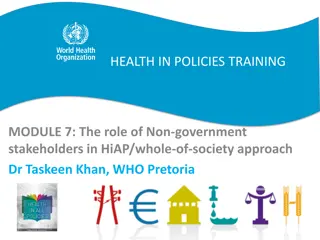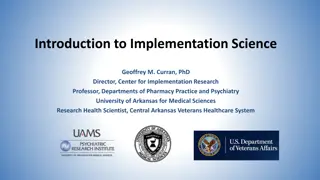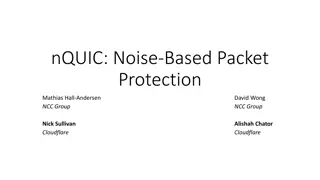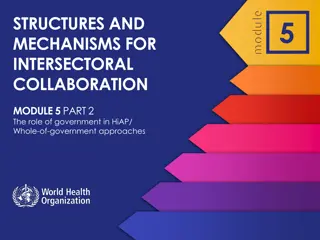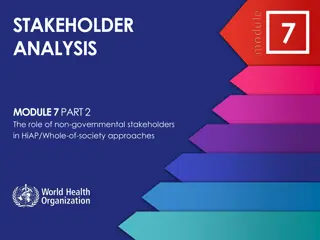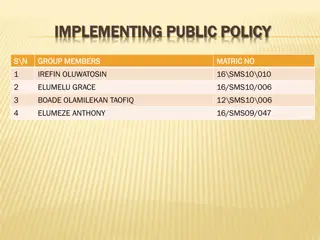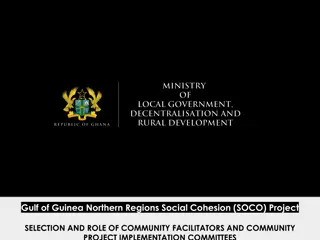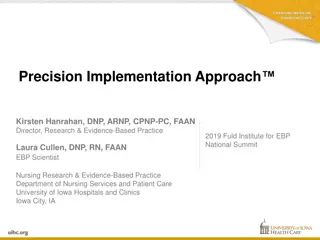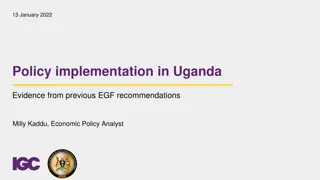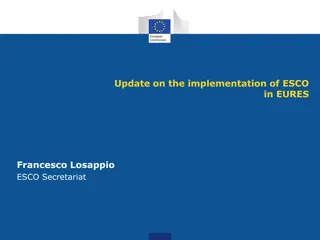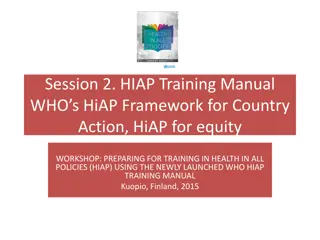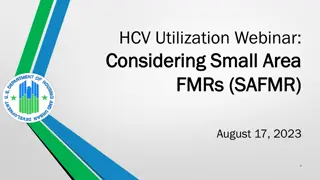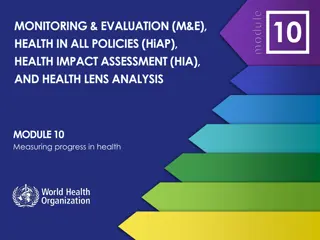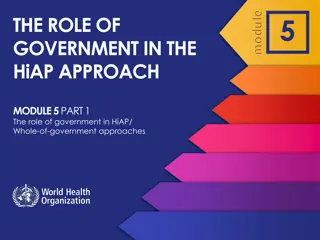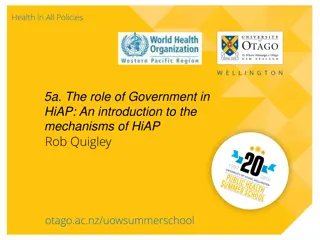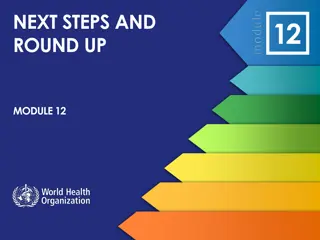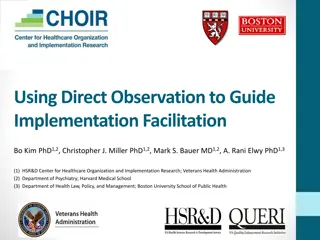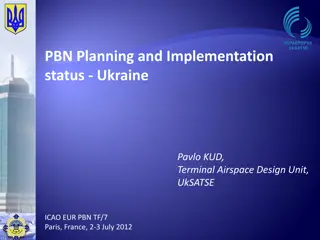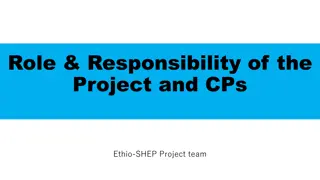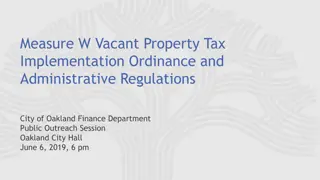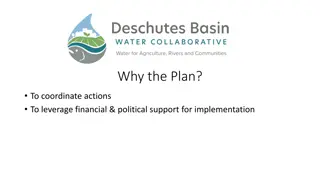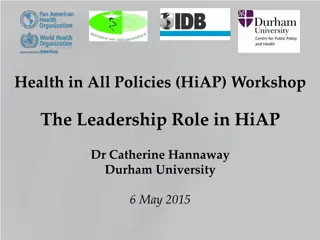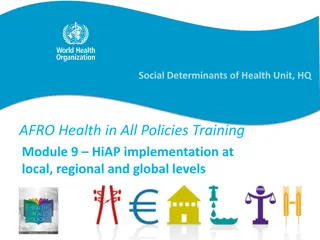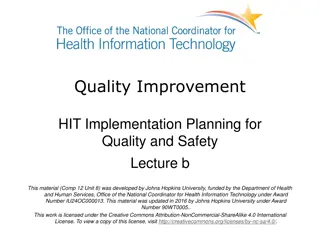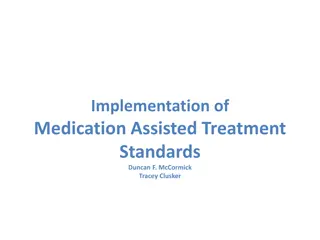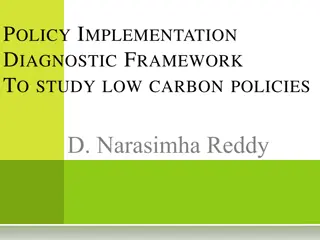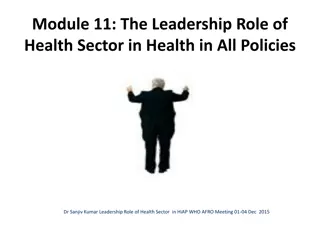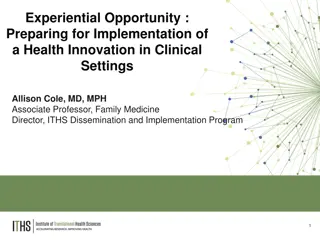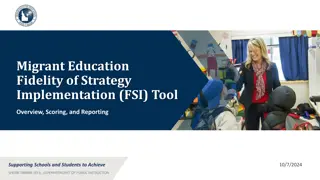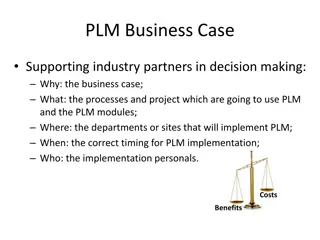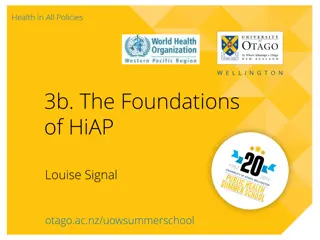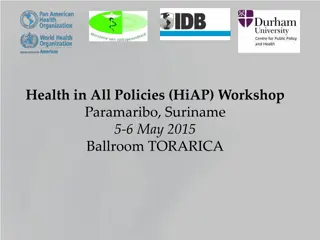11.The Leadership Role in HiAP
Explore the essential role of leadership in Health in All Policies (HiAP), focusing on the leadership's ability to understand, frame issues, and facilitate actions. Discover the necessary skills for HiAP leadership, such as solution-seeking, focusing on mutual gain, and managing differences effectiv
0 views • 10 slides
Role of Non-government Stakeholders in Health Policies Training
Explore the pivotal role of non-government stakeholders in Health in All Policies (HiAP) and a whole-of-society approach. Understand their definition, importance, benefits, challenges, and principles of effective engagement. Learn how primary and secondary stakeholders differ and the significance of
1 views • 21 slides
Understanding Implementation Science: Bridging Research and Practice
This content delves into the principles of implementation science, discussing its significance, outcomes in research, and strategies to enhance the adoption of evidence-based practices. It defines key terms like dissemination and implementation, emphasizing the active approach to behavior change. Si
0 views • 32 slides
Challenges in Standard QUIC Protocol Implementation
The content discusses the challenges and shortcomings of the standard QUIC protocol implementation, focusing on the use of TLS 1.3 for cryptographic handshake. It highlights issues such as complexity in implementation and state machine, lack of a full security proof, and the risk of ossification due
0 views • 108 slides
Government Structures and Mechanisms for Intersectoral Collaboration
Explore the role of government in Health in All Policies (HiAP) and whole-of-government approaches, including the varying implementation of HiAP in different contexts. Learn about common structures such as Cabinet committees, Parliamentary committees, Interdepartmental committees, and more, used for
0 views • 12 slides
Importance of Stakeholder Engagement in Health Policies
Understanding the role of non-governmental stakeholders in Health in All Policies (HiAP) and whole-of-society approaches is crucial for effective policy implementation. This module discusses the definition of stakeholders, benefits, challenges, principles for consultation, and strategies to countera
3 views • 25 slides
Understanding Stakeholder Analysis in Health in All Policies (HiAP) Approaches
Stakeholder analysis in HiAP involves systematically gathering information to categorize stakeholders' importance, anticipate their influence, and develop strategies for involving them in policy implementation. Learn the purpose, process, and benefits of conducting a stakeholder analysis in this mod
2 views • 7 slides
Evolution of Public Policy Implementation Studies
Implementation studies focus on policy change and translating policies into action. These studies emerged in the 1970s in the United States, with different generations highlighting the challenges and approaches to policy implementation. The evolution of top-down, bottom-up, and hybrid theories in im
1 views • 24 slides
Parallel Implementation of Multivariate Empirical Mode Decomposition on GPU
Empirical Mode Decomposition (EMD) is a signal processing technique used for separating different oscillation modes in a time series signal. This paper explores the parallel implementation of Multivariate Empirical Mode Decomposition (MEMD) on GPU, discussing numerical steps, implementation details,
1 views • 15 slides
Community Project Implementation Structures in Gulf of Guinea Northern Regions
The Gulf of Guinea Northern Regions Social Cohesion (SOCO) Project involves the selection and role of community facilitators and Community Project Implementation Committees (CPICs) to facilitate project implementation in clusters of communities. Various committees and structures at national, regiona
2 views • 14 slides
Precision Implementation Approach in Evidence-Based Practice
Implementation is a complex step in Evidence-Based Practice (EBP) process with various strategies for effective and sustainable change. Utilizing local data-driven decisions, the Precision Implementation Approach selects accurate strategies for successful EBP outcomes. Linking process and outcome da
0 views • 18 slides
Policy Implementation in Uganda: Evidence and Challenges
This research delves into the implementation of policies in Uganda with a focus on insights from previous Economic Growth Forum (EGF) recommendations. Analysts like Milly Kaddu and Ramathan Ggoobi highlight the importance of a dedicated policy on implementation. Methods for assessing policy progress
1 views • 12 slides
Understanding Health in All Policies (HiAP) Approach
Governments worldwide are adopting whole-of-government strategies like Health in All Policies (HiAP) to tackle complex issues affecting public health and equity. This course aims to enhance participants' knowledge and skills in promoting, implementing, and evaluating HiAP, fostering cross-sector col
0 views • 9 slides
Update on ESCO Implementation in EURES
The update on ESCO implementation in EURES includes information on mapping tables submission, ESCO implementation process, mapping adoption across EURES countries, pending ESCO implementation in specific countries, and the state of job vacancies encoding with ESCO URIs. It outlines the progress, cha
0 views • 12 slides
WHO's HiAP Framework and Global Mandates for Health Equity
This content discusses the HiAP Framework for Country Action and Global Mandates for promoting health equity. It covers resolutions, declarations, and recommendations by various organizations to address social determinants of health and reduce health inequities. The WHO Director-General is urged to
0 views • 11 slides
Understanding Small Area Fair Market Rents (SAFMR) Implementation Webinar
This webinar recording discusses the implementation of Small Area Fair Market Rents (SAFMR), which offer a more refined approach to housing choice voucher subsidy implementation by replacing Metropolitan Area Fair Market Rents. It covers the background, reasons for the 2019 implementation, options f
1 views • 26 slides
Understanding Monitoring and Evaluation in Health Policies
Exploring the importance of Monitoring and Evaluation (M&E) in health policies, this content delves into various aspects such as Health Impact Assessment (HIA), Health Lens Analysis, and Health in All Policies (HiAP). It covers reasons for M&E, types of assessment, data sources, and the significance
1 views • 33 slides
Challenges in Policy Implementation and Lessons Learned
The content discusses the challenges faced in policy implementation, focusing on the gap between policy design and execution. It highlights key steps in policy-making, reasons for implementation failures, and factors influencing successful policy outcomes. Examples from Zambia's National Science and
0 views • 14 slides
The Role of Government in Health in All Policies (HiAP) Approach
Governments worldwide face major challenges like climate change and obesity, requiring collaborative, innovative solutions. The Health in All Policies (HiAP) approach emphasizes government responsibility for population health through stakeholder engagement, research commissioning, policy formulation
0 views • 13 slides
Government Role in Health in All Policies (HiAP): Assessment and Engagement Mechanisms
Assessing health impacts and engaging stakeholders are essential components of Health in All Policies (HiAP). Various tools and mechanisms, such as health impact assessments, community workshops, and policy audits, play a crucial role in ensuring the integration of health considerations into decisio
0 views • 13 slides
Implementing Health in All Policies (HiAP) for Better Public Health
This presentation covers key messages, objectives, and lessons learned from applying Health in All Policies (HiAP) approach. It emphasizes the importance of collaboration, adaptable ways of working, and whole-of-government and whole-of-society approaches to maximize health benefits and avoid detrime
0 views • 13 slides
Utilizing Direct Observation for Implementation Facilitation
This article discusses the importance of direct observation in guiding implementation facilitation processes. It emphasizes the value of formative evaluation to identify influences on implementation effectiveness. By thoroughly collecting data through mixed-methods direct observation, facilitators c
1 views • 29 slides
PBN Planning and Implementation Status in Ukraine
The PBN Planning and Implementation status in Ukraine involves initiatives such as the implementation of Precision Area Navigation (P-RNAV) and Approach Procedures with Vertical Guidance (APV). Ukraine is working on national RNAV1 implementation for standard instrument procedures at various aerodrom
1 views • 17 slides
Overview of Ethio-SHEP Project Team and Implementation Structure
The Ethio-SHEP project aims to strengthen extension services using a market-oriented approach. The project team includes Japanese experts and Ethiopian national staff, each with specific roles and responsibilities. Implementation is structured based on the existing government setup, with focal perso
1 views • 12 slides
City of Oakland Finance Dept. Public Outreach Session - Measure W Vacant Property Tax Implementation Ordinance
The City of Oakland Finance Department conducted a public outreach session on the implementation of Measure W, a vacant property tax ordinance. The session aimed to receive public input, provide an overview of the tax and exemptions, and outline the implementation process. Measure W, approved by cit
0 views • 11 slides
Strategic Plan for Implementation
Coordinating actions to leverage financial and political support, the plan build process involves workshopping key chapters and drafting plan content for review and refinement by the planning team and working group. Principles for developing the implementation plan focus on maximizing outcomes, addr
0 views • 14 slides
Overview of IFRS Implementation in Japan
The overview of IFRS implementation in Japan includes the voluntary and mandatory phases, benefits for companies, challenges faced during implementation, and future plans for mandatory adoption. The process involves transitioning from Japanese standards to IFRS, with a focus on reducing funding cost
1 views • 16 slides
CAP Implementation Progress in Mali-Meteo and Fast-Tracking in Africa
The Common Alerting Protocol (CAP) implementation in Mali-Meteo by Ismahila Koumare has been significant, with successful alert issuance since 2021. Collaboration with WMO and efforts to fast-track CAP implementation in five African countries show progress and challenges. Mali-Meteo has used cloud-b
0 views • 9 slides
Leadership Qualities for Successful HiAP Implementation
Understanding the diverse leadership roles required for Health in All Policies (HiAP) is crucial for effective implementation. This includes leadership from the health sector, other government departments, NGOs, stakeholders, and the WHO. Developing the necessary leadership qualities such as vision,
0 views • 25 slides
Understanding Public Policy and Its Role in Health Equity
Public policy plays a crucial role in shaping societies by setting the agenda, guiding decision-making, and reflecting government priorities. It influences the distribution of resources, such as healthcare and education, which can either entrench or improve inequality. HiAP aims to enhance equity by
0 views • 17 slides
Exploring HiAP Implementation for Health Equity
This content explores the implementation of Health in All Policies (HiAP) at local, regional, and global levels, discussing challenges, examples, key results, and conceptual frameworks towards achieving health equity. Various studies and training sessions conducted by WHO and PAHO in collaboration w
0 views • 27 slides
HIT Implementation Planning for Quality and Safety Lecture
This material, developed by Johns Hopkins University and funded by the Department of Health and Human Services, focuses on HIT implementation strategies for quality and safety improvement. It covers topics such as big bang vs. staggered approaches, go-live support, maintenance strategies, contextual
0 views • 23 slides
Implementation of Medication Assisted Treatment Standards and Phases to Evidence Implementation
The Medication Assisted Treatment (MAT) Implementation Support Team (MIST) aims to enhance local teams' capacity to implement MAT standards through various methods including clinical QI, evidence collection, information governance, and leadership. The evidence implementation involves three phases: s
0 views • 6 slides
Understanding Policy Implementation Diagnostic Framework for Low Carbon Policies
Explore the Policy Implementation Diagnostic Framework designed to analyze institutional factors and enhance the effectiveness of low carbon policies. Discover the importance of addressing implementation deficits, creating enabling environments, and identifying practices for successful policy implem
0 views • 28 slides
Leadership Role of Health Sector in Health in All Policies
The leadership role of health authorities in Health in All Policies (HiAP) involves collaborating with various stakeholders, managing competing interests, promoting social determinants of health, and addressing challenges like political commitment and limited resources. The World Health Organization
0 views • 24 slides
Implementation Planning for Health Innovation in Clinical Settings
Dive into the experiential opportunity of preparing for the implementation of a health innovation in clinical settings with Allison Cole, MD, MPH. Explore options for operationalizing implementation and understanding your intervention. Engage in discussions on project progress, challenges, and next
0 views • 21 slides
Overview of Migrant Education Fidelity of Strategy Implementation (FSI) Tool
The Migrant Education Fidelity of Strategy Implementation (FSI) Tool is designed to evaluate and ensure the proper implementation of strategies in the Idaho Migrant Education Program (MEP). It aims to measure the fidelity of services delivered, provide a self-assessment guide for local MEPs, and sup
0 views • 19 slides
Strategic PLM Implementation for Industry Partners: A Comprehensive Guide
This detailed content explores the strategic implementation of Product Lifecycle Management (PLM) to support industry partners in decision-making. It covers the business case, processes, project implementation, PLM modules, department/site implementation, timing considerations, personnel involvement
0 views • 6 slides
Fundamentals of Health in All Policies Approach
Health in All Policies (HiAP) is an approach that considers health implications in decision-making to enhance population health and equity. It builds on historical foundations of public health, emphasizing the importance of social determinants and intersectoral collaborations. Key documents like the
0 views • 19 slides
Health in All Policies (HiAP) Workshop in Paramaribo, Suriname - May 2015
Join the Health in All Policies (HiAP) Workshop in Paramaribo, Suriname, to explore the role of government in promoting intersectoral collaboration for better health outcomes. Learn about key terms, barriers, conducive conditions, and practical examples related to HiAP implementation. Gain insights
0 views • 35 slides

